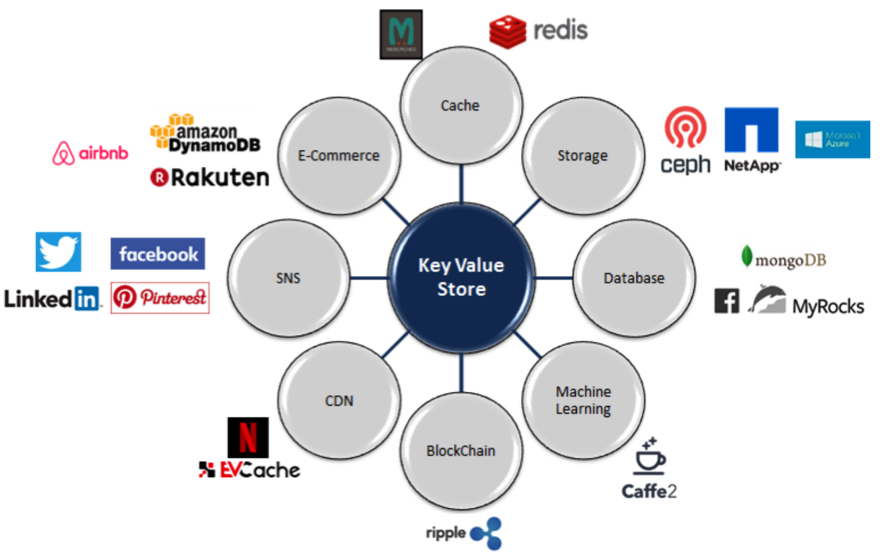Samsung Develops “Key Value” SSD Prototype Meeting New Open Standard
From SNIA
This is a Press Release edited by StorageNewsletter.com on September 6, 2019 at 2:38 pmStandardized Key Value (KV) SSDs will simplify software programming and make more effective use of storage resources in IT applications. This will lead to better storage scalability, longer lasting storage drives, and more efficient CPU utilization on storage servers.
Key Value Stores are Common in Systems at Scale

Samsung Electronics Co., Ltd. announced development of the first standards-based prototype of a new type of SSD that features scalability, durability and CPU-relieving functionality. Firm’s KV SSD prototype moves the storage workload from today’s server CPUs into the SSD without the need for any supportive device, which will lead to greater storage-related software and hardware efficiency.
“Our KV SSD prototype is leading the industry into a new realm of standardized next-generation SSDs, one that we anticipate will go a long way in optimizing the efficiency of network storage and extending the processing power of the server CPUs to which they’re connected,” said Hangu Sohn, VP of NAND product planning, Samsung.
KV SSD prototype is based on a new open standard for a Key Value Application Programming Interface (KV API) that was recently approved by SNIA. Last month, the standard was selected as a Best of Show Industry Standards winner in the Most Innovative Flash Memory Technology Awards, at FMS.
There are benefits of KV storage technology. Rather than operating as a block device, the KV SSD moves resource-draining storage operations from the host CPU to the SSD itself.
This results in:
- Improved system-level performance
- Freeing the CPU from computational work, such as block operations and storage-level garbage collection
- Greater scalability in the number of linked SSDs by reducing CPU overload
- Reduced write amplification (WAF)
- Less wear on each SSD
- Greater software efficiency
KV API standard was developed in response to growing concern that as the speed of SSDs further increases, system-level performance was reaching the point of saturation, allowing relatively few SSDs to be optimally interlinked. As the performance of SSDs continues to improve, the situation is expected to worsen when ever-increasing loads are placed on the CPU to manage block operations.
While there are other approaches to this now under development, KV SSD technology is likely to be the most cost-efficient for use with many storage appliances and IT systems.
Many applications that rely on software-based KV stores will need to handle garbage collection using a method called compaction. Unfortunately, system performance can be severely impacted as both the host CPU and SSD work to clear away the garbage. By moving these operations to the SSD in a straightforward, standardized manner (as just approved by SNIA), KV SSDs will represent an upgrade in the way that storage is accessed in the future. Garbage collection can be handled entirely in the SSD, freeing the CPU to handle the computational work for which it is best suited.
“The SNIA KV API specification, which provides an industry-wide interface between an application and a Key Value SSD, paves the way for widespread industry adoption of a standardized KV API protocol,” said Michael Oros, SNIA executive director.
“SNIA’s KV API is enabling a new generation of architectures for shared storage that is high-performance and scalable. Cloud object stores have shown the power of KV for scaling shared storage, but they fall short for data-intensive applications demanding low latency,” said Hugo Patterson, co-founder and chief scientist, Datrium, Inc. “The KV API has the potential to get the server out of the way in becoming the standard-bearer for data-intensive applications, and Samsung’s KV SSD is a groundbreaking step towards this future.”
Samsung is now working with several forward-looking software and hardware companies in building the ecosystem for its KV SSD prototype and the KV SSD standard. In addition to Datrium, they include FairCom, MinIO, Nexenta by DDN, Pliops, and Zettar.
The KV SSD prototype is sufficiently advanced that it is available for companies looking at developing application software using a standardized next-gene model.













 Subscribe to our free daily newsletter
Subscribe to our free daily newsletter

